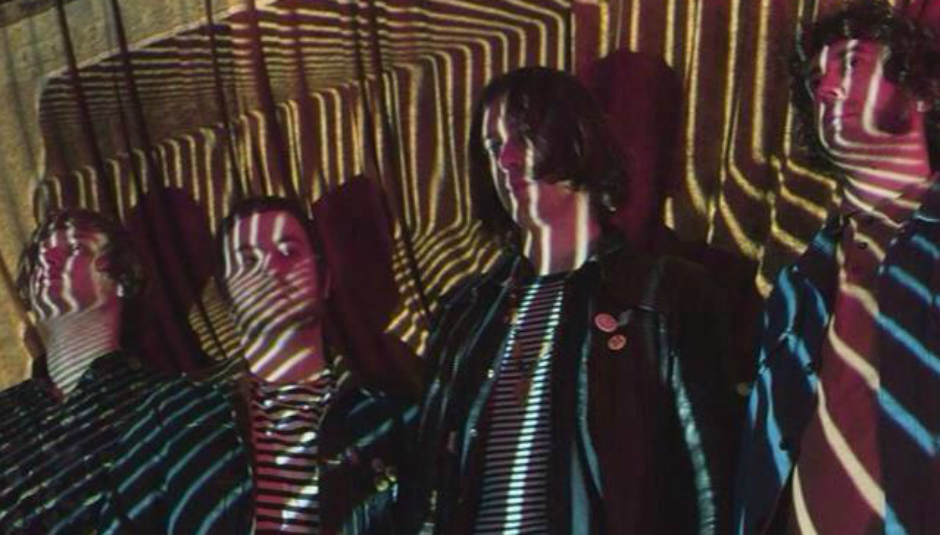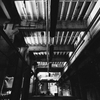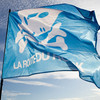Based in the East Midlands, The Cult Of Dom Keller have been one of the most innovative bands on the psychedelic rock scene since forming in Nottingham seven years ago. Over that time, they've also gained a reputation as one of the most exciting live acts on the circuit having played Austin Psych Fest twice, initially in 2011, making them one of the first UK acts to play there.
Having released a number of EPs and singles themselves, their first self-titled album came out on the Berlin based Mannequin label in 2013, followed by The Second Bardo on Cardinal Fuzz a year later. Last week (Friday 22nd July), the band released their third and arguably finest collection to date in the shape of Goodbye To The Light, having recently signed to prestigious psych-rock label Fuzz Club.
DiS caught up with the four-piece - Neil Marsden (vocals/keys), Jason Holt (bass/keys/vocals), Ryan Delgaudio (vocals/guitar/keys) and Al Burns (drums/percussion/samples) - prior to the hometown leg of their album launch at Nottingham Rough Trade.
DiS: It was your album launch last night at Rough Trade East. How did it go?
Neil Marsden: It was really busy for a Monday night. Obviously not as busy as when Blur played there, but still busy all the same!
How's the rest of the tour been?
Jason Holt: It's been really good.
Ryan Delgaudio: This finally feels like the definitive line up of the band now. We're a really solid unit, and I think that's been reflected in the live shows. We finished recording the album together so all the songs are well rehearsed. We know them inside out.
Al Burns: That's the thing with live music. You record some songs and it creates a whole new beast. Well, that's where we've got to with the live set now. A lot of the songs sound different live to how we play them in the studio.
The Cult Of Dom Keller have been around in various guises for eight years, while Neil and Jason have played together in bands like Mind At Large and Ursula Minor since the early 2000s, well before the current psych-rock scene was borne. During that time you've seen lots of bands come and go. What do you make of the scene? Do you feel a lot of artists have jumped on the bandwagon recently?
JH: I think there's a lot of bands that are considered to be psychedelic because they've got a reverb pedal. And a token member of the group who plays percussion and wears sunglasses. So many bands have copied the Brian Jonestown Massacre model as what they need to do instead of doing something new with it, whereas the Brian Jonestown Massacre are only vaguely psychedelic. They're much more folk based but with psychedelic elements; they've got really psychedelic songs but they also have really folky songs. With any scene, 90% of the bands are going to be shit bandwagon jumpers. There's only a few that will stick around for the long haul.
AB: There are some great bands out there too, let's not forget that.
JH: They're the 10%.
NM: Everywhere seems to have a psych fest these days, and more often than not, most of the bands on the bill have no psychedelic elements to them whatsoever.
AB: I don't think it's fair to just pick out the negatives. It's brought a load of great bands to people's attention that have spent years bubbling under. I think it's great that people are getting back into Spacemen 3, Slowdive, and My Bloody Valentine. That was a great era of music, especially when you consider a lot of the shit that came afterwards. Let's not forget the alternative. I'd rather have a hundred bands with reverb pedals and tambourine players than a bunch of careerists trying to copy the latest Kaiser Chiefs single.
RD: All the best bands take various elements from whatever inspires them to make something of their own.
NM: It's all about perspective. We've always tried to do something different. We've never made the same record twice. We don't specifically try to do that, it just depends where we are musically and what we're listening to at the time.
AB: The psychedelic movement is about constantly evolving and moving forwards. It's still got its heritage and there will always be certain reference points, but it can never be derivative as that goes against the whole principle of what psychedelia's about.
JH: You can be derivative but then years down the line, they're the songs that won't stand the test of time.
You've been mainly based in Nottingham since forming, yet never really been part of the scene here. Why do you think that is?
NM: We've always been outsiders. I don't know why, we just have.
AB: It's turning around.
NM: It's never been deliberate, but at the same time we've always kept ourselves to ourselves.
RD: If I'm being honest, it's just never really happened for us here. We actually put on our own psych fest in 2013 and nobody came to it. Whereas if we did the same thing now everyone would go, especially with the Nottingham scene being quite vibrant too. People would come out of the woodwork because the psych scene is deemed to be happening as well. These people were always there, it's just that they're only interested if there's a scene they can latch onto.
What's interesting is the impact Cult Of Dom Keller have made overseas. For instance, you were one of the first UK bands to play Austin Psych Fest five years ago. Why do you think that is?
JH: I think one of the reasons, particularly in America, is they're so far ahead of the UK musically. They'd already heard bands like The Brian Jonestown Massacre, The Warlocks, and The Black Angels long before we had over here. All those bands had been doing the rounds for years so already had that foundation. Whereas at that time, they'd probably have struggled to sell twenty tickets in Nottingham or wherever. The guys that run Reverberation Radio had their antennas out long before these bands had made much of an impact elsewhere, and they always look for what's going on around the world as well.
NM: The internet has been a very powerful tool for us from day one. It's like with the whole Black Rebel thing...
RD: Years ago when we were just called Dom Keller, we had an email from Black Rebel Motorcycle Club. It said they'd included us on the inner sleeve of the American version of one of their albums as a band to look out for and put a picture of our first album on there.
NM: I've never actually seen it apart from a picture online, but that endorsement helped us no end.
RD: It definitely went some way towards us getting on the Austin Psych Fest line-up.
You've recently signed to Fuzz Club Records. How did that come about?
RD: We've known them for years.
NM: And we've played at least ten of their nights at the Shacklewell Arms. Casper from the label said he wanted to put the record out, and it was a unanimous decision to go with them in the end.
RD: A few labels were interested but they didn't show enough enthusiasm or give us the freedom to do what we wanted, whereas Fuzz Club did so it was an easy decision to make.
Do you feel an affinity with many of the acts on their roster?
NM: We've played with the vast majority of those bands over the years, so it made sense to become part of the roster.
JH: Casper's really passionate about the band as well. All of the labels the band has been associated with so far have been pretty awesome in different ways to be honest.
NM: They've all helped us build a name for ourselves at different levels.
RD: Cardinal Fuzz, who put out the second album, have a certain level of kudos, and I think signing to Fuzz Club now represents a firm stake in the ice.
Your third album Goodbye To The Light is out this week. Musically it has a lot more motorik sounds than either of its predecessors. Parts of it remind me of The Horrors reinterpretation of krautrock on Primary Colours. Were any of those an influence on the record?
NM: The songs were chosen very separately. Some of them changed over time while we were working on the record, so it was a pretty organic journey. There was no outside influence as such on how the record turned out. It becomes difficult when you start giving yourself an agenda.
JH: You could say it's a collection of accidents. Happy accidents. It's definitely our most experimental record so far.
NM: This was the first time we've ever gone into a studio with the intention of recording an entire album. The first two were just DIY. Bits and bobs recorded here and there.
JH: The first album literally was just a collection of demos.
RD: Whereas this time we had about thirty songs demoed from the outset. We could have made a triple album if we wanted to!
What happened to the other eighteen songs that didn't make the album? Will they be revisited in the future?
NM: That's an interesting point because we're already recording new demos for the next album so maybe we will revisit some of those songs going forwards.
AB: It's hard though. We're always taking forward steps as a band so it's difficult to look back.
RD: Obviously we've had a few line-up changes over the years but now this feels like the permanent line-up as far as I'm concerned. And I think that's why we have been so creative. We spent the first four years playing the same twelve songs. Now it's as if we've got too many songs! Going back to the original question about the album, it's a lot more exploratory compared to the first two albums. There's a lot more textures and dynamics going on but nothing was forced. We wrote some songs and when we were travelling to festivals or on tour, we used to listen to all the demos back to back.
NM: I remember listening back to one of them in the car once and deciding it needed to be changed there and then.
RD: And then coming back from Belgium we were all really buzzing as we'd chosen the final twelve that would go on the album.
NM: Even the running order stayed the same apart from switching two songs around on side two.
AB: If we put everything out that we've ever recorded we'd have more posthumous releases than Tupac!
JH: We had a guy down last night doing a 3D film of the Rough Trade gig. They're currently figuring out some hologram technology where they can use four angles.
NM: They make psychedelic movies for a living. They recently did a virtual reality movie of an acid trip.
Will the video be released?
JH: I don't know. They got an audio recording of the gig and a stereo-like, visual image of the stage. So the idea is to put these specially designed goggles on, and when you watch it it's almost like being there.
Has the dynamic changed since Al joined the band? Is he also involved in the writing process?
NM: Yes, massively.
AB: I haven't shown any of these guys my songs yet. That's when we release the fifth album and it's all gone a bit jazz odyssey!
NM: The main thing for me is all four of us are pulling in the same direction, which is one thing we've never had in the past. Whether it be the original line-up or when we had another drummer in between, we've always had this thing about drummers over-complicating songs, whereas Al is a master of simplicity.
AB: I remember driving to my first practice and Jason told me to become a caveman!
NM: I don't think Al's done a fill on any of the recordings?
AB: There's one fill.
Were the songs on Goodbye To The Light already formed before Al joined the band?
NM: No. Some were already there, but only in demo form.
JH: Nothing that we did with the previous drummer made it onto the album.
NM: When Jason rejoined the band I think that was the point where we really started to take things more seriously. We started writing again and he was very influential in how we wrote.
RD: He forced us to think more outside the box.
Was there a recurring theme to most of the songs on the album? They all seem quite dark and finite lyrically. Do you see Goodbye To The Light as being a vaguely political record in the current climate?
JH: I guess it is now. More relevant than when we were writing it!
AB: The world is turning into a perpetual bag of shit. It feels like we've written the soundtrack to that.
NM: Something might actually fall into place for us. You never know.
AB: If we write a happy album about loving and caring for everyone, with the next one we might actually fix the world!
NM: There will always be an element of darkness in our songs. I don't think we could write any other way.
You've already mentioned starting album number four. Will any of the songs you've demoed feature in the current live set?
NM: There won't be any in the live set just yet. We're still sharing the demos with each other and making little changes here and there. We learned a lot in the studio making this record so I think the next one should be even more... studio-tastic.
JH: There were definitely a few times where decisions were made and we went back and redid some of the songs. But it turned out for the best. You have to make a mistake in the first instance to be able to learn from it.
What are your plans for the rest of the year?
RD: We have a mini-tour planned for September - Incubate Festival in Londo,n and a few other bits. Then in October we're playing some shows around Europe.
AB: I'm really looking forward to playing the Paradiso in Amsterdam.
Are there any new artists you'd recommend to Drowned In Sound and its readers?
AB: I run a studio in Leicester and one of the artists I'm working with at the minute, Courtney Askew is really great.
What advice would you give to new bands just starting out?
NM: Don't bother!
JH: Basically if you've got a choice then you shouldn't be doing music.
For more information on Cult Of Dom Keller, visit their page on the Fuzz Club website.






















